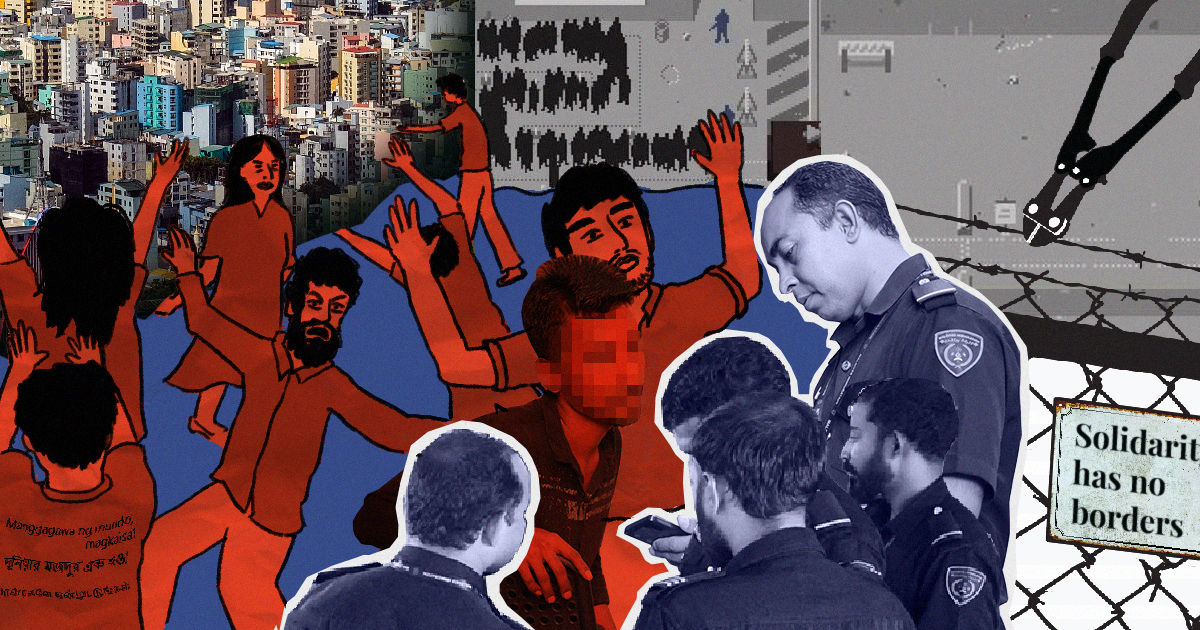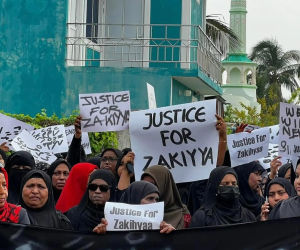
Artwork: DOSAIN
15 Feb 2025, 10:00
What is Operation Kurangi?
An inter-agency effort led by Maldives Police Service, Maldives Immigration and a team from the Ministry of Homeland Security and Technology that began on May 2, 2024 to collect photos and fingerprints of all migrant workers across all islands.
The operation’s purpose is to “account for the migrant worker population” in the Maldives, Home Minister Ali Ihusaan told the press on May 12.
The collected biometric data will be entered into a database that would be made available to all local island councils via a mobile application, which can be used to identify migrant workers, the ministry said at the time.
Starting with Kaafu Himmafushi on May 2, teams in plain clothes have been visiting islands and collecting fingerprints and photos for facial recognition.
Earlier this month, President Dr Mohamed Muizzu said that data collection from 59 islands had been completed for 43,294 migrant workers as of February 6.
What else is the government doing?
Operation Kurangi is part of a wider crackdown on undocumented migrant workers, which included raid operations, mass deportations, and several policy changes over the past year.
For months, the immigration department has been conducting almost daily raids on local businesses, rounding up undocumented workers from cafés, restaurants, shops and beauty salons. Immigration has posted dramatic, action-movie style footage of raid operations, featuring officers chasing after Bangladeshis.
A website called “Immigration Watch” was launched last July for locals to anonymously report “illegally residing migrant workers” and “other immigration related offenses”.
The government received almost 1,300 reports through the website, according to President Muizzu, who said in his address at the opening of parliament that over 6,000 migrant workers had been deported since the administration assumed office in November 2023.
Does it only target migrant workers? What about employers?
Policy changes related to companies that employ migrant workers mainly concern unpaid fees and fines.
In July, the government publicised a list of more than 1,000 companies that owed migrant worker work permit fees and quota fees exceeding MVR 100,000 (US$ 6,485). By October, the government had recovered MVR 1 billion from a total of MVR 1.7 billion in unpaid fees, the Homeland Security Minister said.
The ruling party’s supermajority in parliament amended the Employment Act to introduce a fine of MVR 50,000 for employers found to be negligent towards their foreign workers.
The law defines negligence as withholding salaries, failure to provide basic services, worker exploitation, or illegal employment practices.
With effect in November, employers were required to pay an MVR 1,000 fee to report a migrant worker to be missing and MVR 10,000 to withdraw such a request from the expat system.
What has the government been saying?
The president and senior government officials repeatedly use the term “gavaidhaa hilaafah ulhey bidheyseen” (illegally residing migrant workers) to describe undocumented workers.
Announcing Operation Kurangi last year, Ahmed Sidheeq, state minister for homeland security and technology, stressed that he would describe undocumented migrant workers as “illegal labourers”.
“Illegally residing…I won’t say that [such a] person is an undocumented person or labourer, I will say they are illegal labourers. The reason is because illegally residing persons cannot be seen as undocumented persons,” he contended.
“As you know, this is a very serious problem. Maldivians are losing a lot of opportunities and expatriates are controlling it because there are many migrant workers living in Maldives illegally. So this is a problem that the government is treating as a national problem.”
Why is this characterisation problematic?
The borders of Maldives are ocean and points of entry are international airports and seaports. Most migrant workers arrive legally with the required documentation.
A research paper by the Public Interest Law Center last year found that over 70 percent of Bangladeshi workers entered the Maldives through legal channels. But the majority fell into irregular status post-migration.
Several factors, including failure of employers to make required payments, failure to renew work visas, employers reporting employees having absconded or escaped, can lead to migrant workers becoming irregular or undocumented.
The research paper detailed several ways in which migrant workers are exploited by employers in the Maldives, which may explain why many migrant workers flee from their employers.
Key findings:
70 percent of Bangladeshi migrant workers do not have access to their own passports
94 percent of respondents had to pay recruitment fees of up to US$ 2,200, with more than half resorting to loans to cover these costs, despite legal requirements for recruitment facilitators to bear these expenses.
Over 70 percent of respondents reported working more than 54 hours per week.
The average salary was MVR 6,760.
Discussion
No comments yet. Be the first to share your thoughts!
No comments yet. Be the first to join the conversation!
Join the Conversation
Sign in to share your thoughts under an alias and take part in the discussion. Independent journalism thrives on open, respectful debate — your voice matters.




